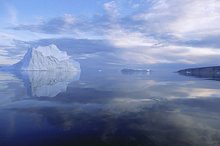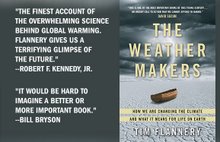PREAMBLE: In this issue of Global Perspectives, we report on the essence of the Nansen Conference on Climate Change and Displacement in the 21st Century, convened in Oslo Norway, June 6-7, 2011. As summarized by IISD reporting services (1):
Climate change is the world’s most serious threat to sustainable development, with adverse impacts projected for the environment, human health, food security, economic activity, natural resources and physical infrastructure. While global climate varies naturally, rising concentrations of anthropogenically-produced greenhouse gases in the earth’s atmosphere are leading to changes which, over the short- and long-term, lead to an increase in the severity of droughts, land degradation, desertification, salinization, riverbank and coastal erosion, sea-level rise and the intensity of floods, tropical cyclones and other geophysical events. This in turn will negatively affect crop yields and food production, water supplies, livelihoods and human settlements.
An impact of particular concern is the potential for human displacement and migration (1): it is projected that climate change and the increasing frequency of natural disasters will trigger larger and more complex movements of people, including large-scale displacement of people, both within and across borders, and has the potential to render some people stateless. The implications for human welfare and security, and for strategies for adaptation, DRR, humanitarian aid and protection of displaced people, could be far-reaching.
While environmental migration is not officially recognized, according to the International Organization on Migration (IOM), the number of persons forced to move due to climate change and environmental degradation by 2050 is forecast to vary by a factor of 40 (between 25 million and 1 billion) and largely depends on which climate scenario unfolds. The world’s poorest and most crisis-prone countries will be disproportionately affected, with the level of vulnerability, exposure to risk and capacities of people being among the determinants of this migration (1).
BACKGROUND: This issue of Global Perspectives was stimulated mostly by media reports from the conference, particularly that which appeared on June 8th, 2011 in the Guardian newspaper (2). In “A perfect storm of stupid” Amy Goodman notes that “the news is full of extreme weather headlines – floods, wildfires, droughts, tornadoes – but the US still doesn't get climate change”. We feel obliged to add that nor do a lot of other countries that also should know better. For examples, neither Canada and Australia, both of whom have recently endured unprecedented flooding while the prospect of historically hotter and drier weather now confronts them, have in place serious policies to combat global warming. All three countries mentioned are heavily dependent on fossil fuels, as are many other countries around the world.
Goodman quotes Bill McKibben, founder of the grassroots climate action organisation 350.org, who has been advocating to stop climate change for more than two decades:
"We're making the Earth a more dynamic and violent place … We're trapping more of the sun's energy in this narrow envelope of atmosphere, and that's now expressing itself in many ways. We don't know for sure that any particular tornado comes from climate change. There have always been tornadoes. We do know that we're seeing epic levels of thunderstorm activity, of flooding, of drought, of all the things that climatologists have been warning us about."
Drawing attention to the plight of climate refugees, at the Nansen Conference, the United Nations High Commissioner for Refugees, Antonio Guterres warned of two threats: slow onset disasters like drought and desertification that lead to "a tipping point at which people's lives and livelihoods come under such serious threat that they have no choice but to leave their homes", and "natural disasters [that] uproot large numbers of people in a matter of hours" (2). He noted that most climate refugees will be internally displaced within their home countries. However, Naomi Klein (author of The Shock Doctrine – the Rise of Disaster Capitalism) goes further in a recent warning, "This crisis will be exploited to militarise our societies, to create fortress continents”. (2)
According to Linda Ngyen of PostMedia News (3), Lester Brown, for the Earth Policy Institute, Washington, D.C. stated:
“We know the best way to manage disasters is to prevent them in the first place.” “We should’ve done something about climate change years ago, which makes it all the more urgent now to begin to get serious about cutting carbon emissions,… we don’t know the point of no return… nature sets these… thresholds…”
Brown will deliver this message in Toronto to more than 1,500 participants from around the world at the upcoming 21st World Conference on Disaster Management, June 19-22.
According to Brown, the world is ill-prepared and may not survive an impending colossal natural disaster such as flooding, hurricanes, tornadoes, droughts or record-breaking heat waves that are triggered by climate change. “At some point, these disasters will be unmanageable at the societal level,” said Brown. Furthermore, a number of recent weather-related incidents should act as a warning for the world to take action. He notes that one of the most troubling impending disasters is the current “irreversible” rapid melting of the Greenland ice sheet. If temperatures continue to rise, it is feared the ice sheet will melt completely and raise sea levels by a projected seven metres, which will disrupt rice production in the river deltas in Asia, where 60% of the world’s population lives. (3)
Envoi: It is sadly obvious that it is the poor and the dispossessed who are so far bearing the burden of climate change, not the overpaid CEOs in the fossil fuel and financial industries, nor for that matter the politicians and media sycophants who support them. However, a more positive scenario than the one painted still appears to be largely a matter of choice, even as most of our current political “leaders” remain negligent in not making a serious decision to come to grips with this potentially terminal threat. To quote again from the conference summary (1):
“Responding to climate change has the potential for millions of green jobs, to transform societies to energy systems that are safe, that are stable and that are based on renewable energy and energy efficiency. Moving away from fossil fuels and towards renewable energy is being embraced now by more and more countries, although funding for alternative systems pales in comparison to subsidies for oil, gas and coal.”
References:
1) Summary of the Nansen Conference on Climate Change and Displacement in the 21st Century. 6-7 June 2011. Linkages. IISD Reporting Services. http://www.iisd.ca/ymb/climate/nansen/html/ymbvol189num1e.html
2) Goodman A. A Perfect Storm of Stupid. The Guardian June 8, 2001. http://www.guardian.co.uk/commentisfree/cifamerica/2011/jun/08/climate-change-extreme-weather
3) Nguyen L, World needs to manage weather disasters by preventing climate change: environmentalist. Postmedia News June 12, 2011. http://www.canada.com/news/World+needs+manage+weather+disasters+preventing+climate+change+environmentalist/4933889/story.html#ixzz1PITTzgJ7
FROM a Great Canadian and World Statesman
"A great gulf... has... opened between man's material advance and his social and moral progress, a gulf in which he may one day be lost if it is not closed or narrowed..."
Lester B Pearson
http://nobelprize.org/nobel_prizes/peace/laureates/1957/pearson-lecture.html
Wednesday, 15 June 2011
Subscribe to:
Comments (Atom)
INSPIRATIONAL WELCOME ............................... from T.S.Eliot's "Little Gidding"
If you came this way From the place you would come from... It would be the same at the end of the journey...
If you came, not knowing what you came for, It would be the same... And what you thought you came for Is only a shell, a husk of meaning... From which the purpose breaks only when it is fulfilled If at all.


























